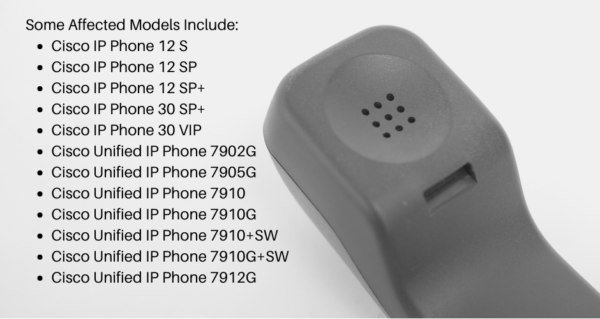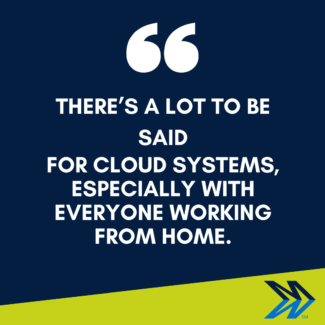September 24, 2020
After nearly two decades in service and one decade of being unserviceable, many of Cisco’s older phones are about to face the final curtain. Or are they?
Many that heard the news in recent months have likely been panic-stricken about replacing the impacted phones. Fortunately, Cisco just issued a bit of a reprieve. Cisco recently announced that, “After a careful review of feedback from our customers and partners, Cisco is reversing its decision to deprecate multiple models of phones in Release 14. This will allow our customers to get additional usage from working models of Cisco IP Phones and not force immediate migration to alternate clients or phones during challenging business timeframes. The intent is to give our  customers the opportunity to move to newer phone models and clients at a pace that is reasonable.”
customers the opportunity to move to newer phone models and clients at a pace that is reasonable.”
So fortunately, we’ve caught a bit of a break in 2020, but now is the time to begin planning your strategy because the end is inevitable. Earlier in the year, Cisco’s official statement on the matter minced no words: Cisco will not issue bug fixes or security enhancements for endpoints that have reached End of Software Maintenance or End of Support status, regardless of whether those endpoints are deprecated or not deprecated. Cisco will not test Unified Communications Manager with End of Life phones. Nor will we fix Unified Communications Manager bugs that are related to End of Life phones unless the issue can be replicated on a phone that is not End of Life.
With more than 200,000 Cisco customers worldwide, including 95 percent of Fortune 500 companies, that means an incalculably large number of phones from coast to coast and around the world will either need to be replaced with newer models or abandoned for other types of communications systems. Cisco’s latest announcement gives companies more time to contemplate their next move.
Out with the old, in with the new
“I was recently doing a statement of work for a Chicago hospital, and 500 of their 900 phones were going to be affected by this,” says John Irey, Principal Consultant at Mindsight. “So I’m trying to get ahead of things. If they’re going to stay with a Cisco system or shift to a different one, we need to start planning.”
Irey recommends the same approach for other organizations that are similarly affected and want to be proactive when it comes to budgeting and workflow. “If I’m going to need to spend $200,000 on equipment, maybe I need to re-evaluate my overall plan,” he says using a hypothetical example. To that end, Mindsight performs a full system scan that pinpoints which phones are destined for the graveyard so customers can institute changes more gradually and with less disruption.

Softphones and the Cloud
Replacing obsolete Cisco phones with modern feature-rich ones is certainly one option, Irey says, but it’s not the only option. Maybe it’s finally time to implement an entirely new system. That could mean new cloud-connected physical phones or PC-integrated “softphones” that make use of built-in cameras and internet connections. With so many people working remotely due to COVID-19, Irey says, the latter option makes more sense than ever. Instead of registering to a power-hungry on-site server that requires stacks of servers and a special cooling system, cloud-connected phones and softphones register to a web-based service and are capable of running Cisco’s cloud communication system, WebEx Calling, or something similar.
 Perhaps best of all, there’s no hardware to maintain and troubleshooting can be done from anywhere at any time. “There’s a lot to be said for cloud systems, especially with everyone working from home,” Irey says. “I can power up my laptop and bring up my softphone, which registers back to the company cloud system, and I’m up and running. I don’t need to worry about forwarding my office number to home or jump over any technical hurdles.”
Perhaps best of all, there’s no hardware to maintain and troubleshooting can be done from anywhere at any time. “There’s a lot to be said for cloud systems, especially with everyone working from home,” Irey says. “I can power up my laptop and bring up my softphone, which registers back to the company cloud system, and I’m up and running. I don’t need to worry about forwarding my office number to home or jump over any technical hurdles.”
Compared to the early aughts, when Cisco’s “end of life” phones were considered state-of-the-art, today’s sophisticated communications technology is rife with useful bells and whistles. Even so, Irey says, on the most basic level customers still want what they’ve always wanted.
“At the end of the day, they’re looking for a phone that acts like a phone.”
About Mindsight
Mindsight is industry recognized for delivering secure IT solutions and thought leadership that address your infrastructure and communications needs. Our engineers are expert level only – and they’re known as the most respected and valued engineering team based in Chicago, serving emerging to enterprise organizations around the globe. That’s why clients trust Mindsight as an extension of their IT team.
About the Expert
John Irey is a Principal Consultant at Mindsight, an IT Services and Consulting firm located in the Chicago area. With nearly 20 years of experience in information technology, John has helped businesses of every size optimize the technology powering unified communications. He has extensive experience with collaboration technologies and seeks to provide a consultative voice to IT leaders, who rely on Mindsight’s transparency to make the best technology investments. John earned his BA/BS in Information Systems and continues to focus on how emerging technology, such as machine learning and artificial intelligence, impact the contact center. John enjoys spending his free time with his wife and two young children.
